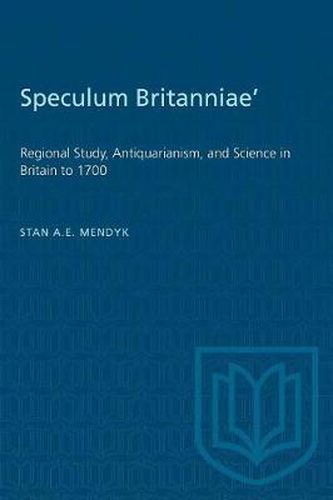Readings Newsletter
Become a Readings Member to make your shopping experience even easier.
Sign in or sign up for free!
You’re not far away from qualifying for FREE standard shipping within Australia
You’ve qualified for FREE standard shipping within Australia
The cart is loading…






Local history has been studied in Britain for at least 500 years. In this comprehensive study Stan Mendyk examines many of the first county and regional histories compiled in Britain (focusing especially on England) up to about 1700.
Mendyk considers first the precedent set by the ancients, such as Strabo and Ptolemy, in firmly establishing chronographical (i.e., topographical-historical) investigation, and then within that framework explores the work of a number of British historians: Bede, Gildas, William of Worcester, John Leland, William Camden, and William Lambarde. He offers summaries of the contents of their works, an identification of the authors and their connections with one another, and explanations of the means used to collect information. He notes trends within the works, such as the infusion of a patriotic element into history and they role of insularity in shaping them.
Placing these works in a broader context, Mendyk discusses some of the changes in the study of history during this period and assesses their impact on local historiography: the conflict between ancients and moderns, the development of natural history and geo-history as fields of study, and the overall development of natural history and geo-history as fields of study, and the overall development of historiography in the Tudor-Stuart period. Political and social upheaval each play a part, as do a number of other factors: the voyages of discovery, the work of Sir Francis Bacon and the Royal Society in promoting the new science, and the continuing interest in such non-scientific endeavours as alchemy and astrology.
Mendyk presents an approach that integrates history, geography, historiography, and science to expand the boundaries of conventional interpretations of local history, and in so doing illuminates a remarkable body of early work in the field.
$9.00 standard shipping within Australia
FREE standard shipping within Australia for orders over $100.00
Express & International shipping calculated at checkout
Local history has been studied in Britain for at least 500 years. In this comprehensive study Stan Mendyk examines many of the first county and regional histories compiled in Britain (focusing especially on England) up to about 1700.
Mendyk considers first the precedent set by the ancients, such as Strabo and Ptolemy, in firmly establishing chronographical (i.e., topographical-historical) investigation, and then within that framework explores the work of a number of British historians: Bede, Gildas, William of Worcester, John Leland, William Camden, and William Lambarde. He offers summaries of the contents of their works, an identification of the authors and their connections with one another, and explanations of the means used to collect information. He notes trends within the works, such as the infusion of a patriotic element into history and they role of insularity in shaping them.
Placing these works in a broader context, Mendyk discusses some of the changes in the study of history during this period and assesses their impact on local historiography: the conflict between ancients and moderns, the development of natural history and geo-history as fields of study, and the overall development of natural history and geo-history as fields of study, and the overall development of historiography in the Tudor-Stuart period. Political and social upheaval each play a part, as do a number of other factors: the voyages of discovery, the work of Sir Francis Bacon and the Royal Society in promoting the new science, and the continuing interest in such non-scientific endeavours as alchemy and astrology.
Mendyk presents an approach that integrates history, geography, historiography, and science to expand the boundaries of conventional interpretations of local history, and in so doing illuminates a remarkable body of early work in the field.